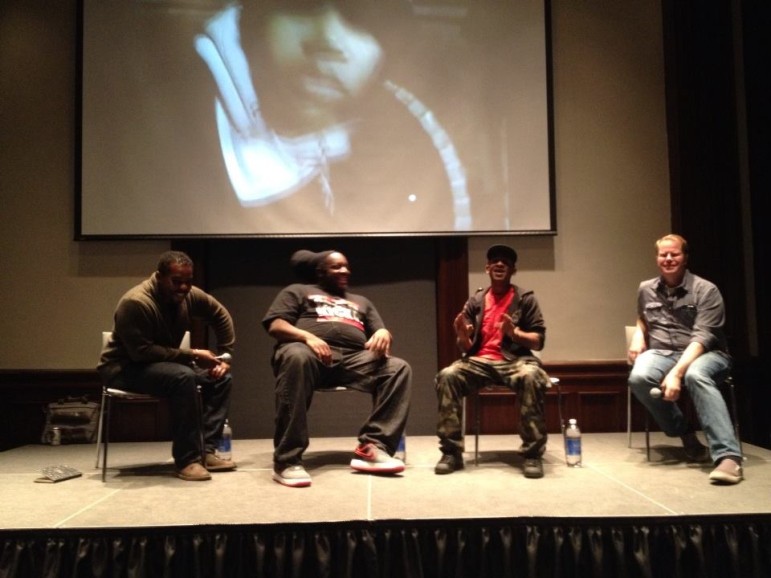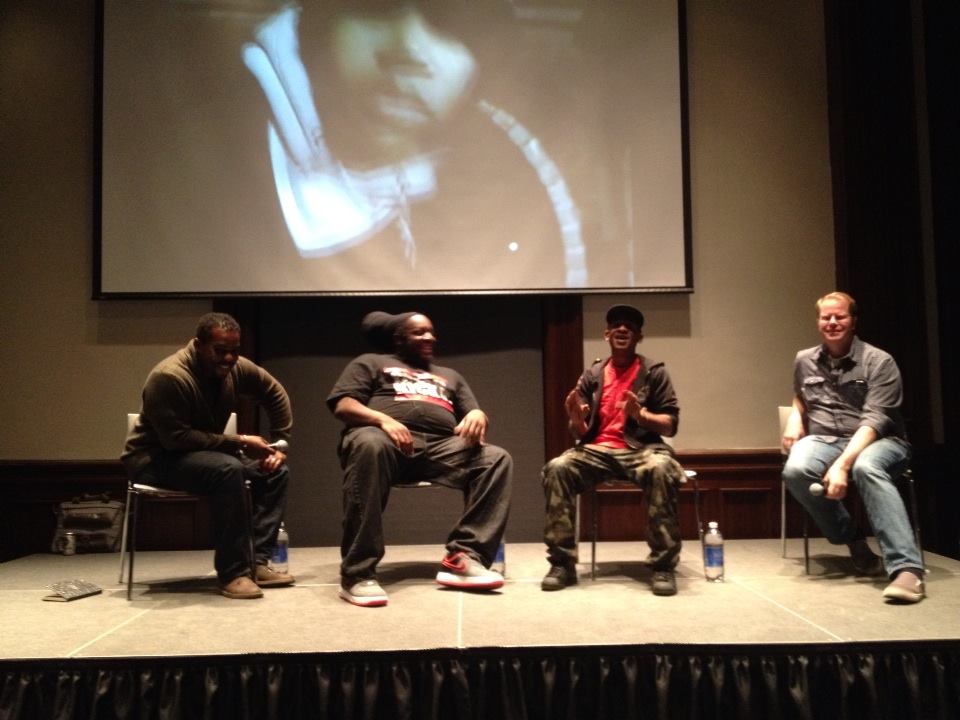
Chris Dell / JJIE
Buckshot (middle right) and DJ Evil Dee (middle left) of Black Moon joined forces with the Brooklyn Historical Society and Brooklyn Bodega on Nov. 21 to discuss the 20th anniversary of their debut LP, Enta Da Stage.
NEW YORK-- On Kenyatta Blake's block in Crown Heights, Brooklyn in 1993 -- and, for that matter, on most Brooklyn blocks at that time -- it wasn't uncommon to witness a teenager get shot and killed over a pair of Air Jordan's.
Two decades ago, Nike's were an oft-viewed symbol of evil for Blake and his friends, who spent their time breakdancing, spitting rhymes and doing everything they could to "stay out of the system." The rising hip-hop scene, which at the time coincided with the violence and often glorified the high-priced kicks and the giant corporations that made them, did everything but alleviate the bloodshed.
Even now, the billion-dollar record labels that run hip-hop seem to care more about promoting rapper Rick Ross’ date-rape lyrics than about promoting lyrics that aim to educate or to empower youth. The "me first" mindset is represented in something as simple as Kanye West's 2009 line of Louis Vuitton sneakers, or Big Sean's 2011 snakeskin-inspired Adidas shell toes that run for $160 on average.
 It's a big reason why Blake, who since 1993 has gone under the rap monicker "Buckshot,” is attempting to disrupt the game.
It's a big reason why Blake, who since 1993 has gone under the rap monicker "Buckshot,” is attempting to disrupt the game.
Buckshot recently announced plans to release a line of low-cost, "industry-approved" sneakers as an affordable (and fashionable) alternative to the overpriced options currently saturating the sneaker market.
"A lot of kids don't realize this, but there's only four to five major shoe companies out there -- they're charging enormous prices just for a hoodie with a piece of rubber on it," Buckshot said. "We're a threat to these companies who brainwash our youth."
Earlier this week Buckshot and DJ Evil Dee, founding members of the legendary, Brooklyn-based hip-hop group Black Moon, joined forces with the Brooklyn Historical Society and Brooklyn Bodega to discuss the 20th anniversary of their debut album, “Enta Da Stage,” as well as to talk about hip-hop's unprecedented popularity and ever-increasing influence on today’s young people.
It was an intimate affair, one in which Buckshot and Evil Dee recounted their days as teenagers fighting for a record deal, answered questions from the audience and reaffirmed why hip-hop's message to youth is more important today than ever before.
"Told it First Hand: A conversation of Hip Hop's 'do-ers'" was the first-ever event in which the Brooklyn Historical Society, founded in 1863, recognized the genre.
"We're hoping to give a voice to the side of Brooklyn's history that we don't read in every textbook," said Marcia Ely, vice president for programs and external affairs at the Brooklyn Historical Society. "Our mission is to make everyone in Brooklyn know that this place is for them.”
Buckshot isn't the first rapper to design his own shoe. He is, however, the first rapper to manufacture his own line of sneakers, which is fitting for the co-founder and CEO of Duck Down Records, hip-hop's most successful and longest active independent label.
Buckshot said he plans to charge "only $50 to $60" for some of his most expensive pairs, which have already been backed by hip-hop icons like Terry Cruz, 50 Cent and Eminem.
Watch: Buckshot of Black Moon talks Hip Hop and "Sneaker Hypocrisy" with JJIE
"The hip-hop industry, ever since the days of Kool G Rap and Big Daddy Kane, has been dictating what’s hot," Buckshot said. "Other rappers have come out with their own shoe, but they didn't have a system. …They went through the monopolies, and that's like saying they're still scared of 'the man.'”
Wes Jackson knows a thing or two about hip-hop and Brooklyn history.
The founder and president of Brooklyn Bodega, a nonprofit organization that has become synonymous with hosting the annual Brooklyn Hip Hop Festival, Jackson sits on the board of trustees at the Brooklyn Historical Society and has spent the last two years hosting "hip-hop history" lectures at college campuses nationwide.
"Hip-hop is the ultimate unifier, like sports or war, and it's not taken seriously enough," Jackson said. "Some people still think hip-hop is just a bunch of black kids running around grabbing [themselves], but it’s so much more than that. We cannot allow these people to rewrite history."
Jackson and his "Bodega Education Initiative," which hosted the event, hopes to create an online hip-hop archive with interviews where young listeners can not only discover new music, but learn a thing or two about its history in the process.
"Hip-hop isn't just education, it's a way to save kids who are trapped in the juvenile justice system," Jackson said. "If we can educate the youth about the entrepreneurial aspect of hip-hop, then that's what's going to keep them out. This event with Black Moon was about the music, but I would argue it was more about the struggle of an 18-year-old dancer turned rapper, trying to manifest his dreams in 1992. After all, this isn't the 'BK Heights' or 'Cobble Hill' societies, this is the Brooklyn Historical Society."

Pingback: Juvenille Justice Information Exchange covers "Told It First Hand" | Brooklyn BodegaBrooklyn Bodega